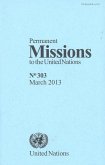When Samir Sanbar, a journalist and graduate of the American University of Beirut, left his native Lebanon in the 1960's for a job at United Nations Headquarters in New York, he could hardly have imagined the rich opportunity and adventure it was to offer him over the coming 33 years. His latest book "Inside The United Nations" is a memoir of his life at the UN. On his retirement, Sanbar had risen to the rank of Assistant Secretary-General, the UN Secretariat's highest-ranking civil servant from the Arab world. Much loved and respected by his staff and members of the diplomatic community alike, he had worked with five UN Secretaries-General, and developed working and personal relationships with many world leaders. As Head of the UN Department of Public Information, he amassed an encyclopedic knowledge not just of the structure and workings of the United Nations, but also of its people - the staff, diplomats and heads of state he dealt with in the UN offices next to the East River. As an expert Arabist, Samir Sanbar was at times assigned to nation-building missions or cloak-and-dagger operations in the Middle East, sometimes so secretive that the payroll unit, unaware that he still existed, stopped paying his salary. The book reads at times like a spy thriller, at times like a history book, at times like a satirical magazine. With his Ustinov-like anecdotes, and impish yet discerning sense of humor, Sanbar casts a critical eye on the UN system and the diplomatic and political intrigue that goes on next to New York's East River. He provides fresh insight into historical events that didn't quite seem to hang together at the time. Was there ever an éminence grise at UN HQ, and if so, who was it? Not afraid to name names and cite real-life examples, Sanbar decries the lack of leadership in UN diplomacy, which he attributes to cronyism, abandonment of its institutional memory, disloyalty to the UN 'Oath of Office' and lack of the sort of leadership shown by its founding fathers, such as Dag Hammarskjold. We also see the human side of Samir Sanbar. He speaks movingly of his own family, but it is obvious that he sees the UN as a family too. He was exasperated by a suggestion to save money at UN HQ by replacing the tour guides with talking machines and so lose their 'human warmth'. He points out that some famous people started their careers as UN tour guides. When Luciano Pavarotti was appointed the first UN Messenger of Peace, Sanbar struck up an immediate friendship and arranged a meeting with him for which even the Secretary General cancelled all previous appointments. Students of politics, history and diplomacy, will find this book essential to their understanding of the UN system and its place in history, and those who simply enjoy a good read will appreciate its insightful and witty observation of life in that extra-territorial enclave across First Avenue, which has never yet been so thoroughly depicted.
Hinweis: Dieser Artikel kann nur an eine deutsche Lieferadresse ausgeliefert werden.
Hinweis: Dieser Artikel kann nur an eine deutsche Lieferadresse ausgeliefert werden.








